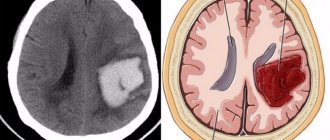The menstrual cycle is normal
The menstrual cycle is the time period from the first day of the onset of menstruation to the first day of the next menstruation. The normal range is 21-35 days. Most often, the average duration is 28 days.
If the cycle is less than 21 and more than 35 days, then this is already considered a deviation.
The first menstruation begins in girls aged 11 to 14 years. As a rule, they are not regular. After menarche, the cycle is established within a couple of years and is stable until the onset of perimenopause. The duration of one menstruation varies from 2 to 8 days.
Menstrual cycle
What will the doctor do
Your doctor will help determine the cause of the bleeding.
Even a routine examination is not always enough for this. Most likely, you will have to take tests for sexually transmitted diseases, do several smears, a pregnancy test (if there is a reason) and an ultrasound examination. This is the minimum, to which visits to an endocrinologist and examinations in this area can be added. In order not to increase bleeding, you should not take certain medications: aspirin, for example, increases bleeding. If you feel pain, take regular pain relievers such as ibuprofen. And to reduce bleeding, you can try tranexamic acid drugs. Just remember to read the instructions and take the pills correctly. And be sure to tell the doctor what you drank and in what quantities.
Bleeding after menstruation: main causes
Any uterine bleeding during the intermenstrual period is called metrorrhagia.
There are many reasons for its occurrence:
- inflammatory processes of the genitourinary system;
- the presence of an intrauterine device;
- hormonal disbalance;
- experienced stressful situations;
- pathology of the uterus;
- endometriosis, etc.
How the body behaves depends on the woman’s age and the state of her reproductive system.
Endometriosis is one of the causes of uterine bleeding
In 2-3 days
If blood starts flowing again 2-3 days after menstruation, but this condition does not cause malaise or pain, then most often the cause of this disorder is a hormonal imbalance.
Sometimes blood clotting decreases, which entails prolonged cleansing of the uterus from the endometrium. As a rule, such discharge does not entail negative consequences and goes away on its own within 2 days.
One of the reasons for bleeding after menstruation is ectopic pregnancy. In this case, the volume of discharge during menstruation itself is reduced and the intensity decreases. After its cessation, metrorrhagia is observed in a couple of days, and clots may appear. If there is pain in the lower abdomen, you should consult a doctor.
A week later
For most girls, this period coincides with the moment of ovulation. To move into the uterus, the walls of the follicle are torn. During the release of the egg, many people feel discomfort and pain. The remainder of the follicle tissue is released along with other mucous secretions.
Bleeding after menstruation a week later can also occur due to erosion or endocervicitis.
In the middle of the cycle
Due to the individual characteristics of a woman’s body, bloody secretion may occur 12-15 days after menstruation. This may be due to late ovulation. It differs from menstruation itself in that the discharge is pink in color because very little blood is released and it mixes with clear vaginal secretions. Everything goes away within 1 day.
If blood is observed after 2 weeks, this may indicate pregnancy. This type of bleeding is called implantation bleeding.
It occurs when a fertilized egg moves into the uterus. To secure it, it clings to the cells of the uterine epithelium, thereby causing damage to blood vessels. Many women mistake this discharge for the first day of menstruation.
After 40 years
At the age of 40, women's hormonal levels change and disturbances appear due to various diseases. The situation is aggravated by various gynecological operations, abortions, uterine injuries received during childbirth, etc.
During perimenopause, the ovaries reduce their functionality, the menstrual cycle gets confused and becomes irregular. Discharge during menstruation may be scanty and spotting, and may be replaced by slight bleeding with clots. This is often associated with the development of uterine fibroids. Anovulatory cycles are occurring more and more frequently.
Uterine fibroids
When taking birth control pills
Starting or stopping oral contraceptives can cause bleeding after menstruation. This situation does not indicate pathology. In the first few months, the body needs to adapt to changes in hormonal levels.
The appearance of discharge in the follicular phase indicates that the drug contains a low amount of estrogen. If there is a violation of the pill regimen, then severe uterine bleeding may begin, which is unpredictable.
If such discharge does not go away for a long time (more than 4 months), then you need to contact your gynecologist with a request to choose another means of contraception.
With clots
Blood clots form due to the presence of a kind of septum in the uterus. It does not allow the secretions to come out completely, accumulating their remains. If such formations are not removed, the risk of infection increases. Such a septum can be congenital or acquired as a result of previous abortions or childbirth. The IUD can also cause clots because it is an artificial septum.
In addition, such discharge may occur due to endometriosis. In this case, the endometrium grows into the muscles of the uterus, its particles are thrown into the abdominal cavity and affect the pelvic organs.
After sex
One of the most common reasons is violent sexual intercourse. As a result, microcracks and damage to the walls of the vagina and cervix appear.
One of the most dangerous reasons for bleeding from the uterus after sex is a ruptured ovarian cyst. Apoplexy is accompanied by severe pain, increased blood pressure, dizziness, and internal bleeding. Emergency medical attention required.
After sexual intercourse, blood may occur if a woman has erosion or other pathologies of the reproductive system. This may include polyps, cervicitis, or previous trauma.
Video about discharge in women
Treatment
Therapy depends on the cause of metrorrhagia. To stop bleeding caused by hormonal disorders, hormone therapy is prescribed in accordance with the disease. It is necessary to stop blood loss; for this, the following groups of drugs are used:
Hemostatic agents (hemostatics):
Vikasol . Promotes the formation of prothrombin, normalizes blood clotting. Contraindications: tendency to thrombus formation, hypersensitivity to the components of the drug. Side effects: vitamin K hypervitaminosis, allergies. The average price in pharmacies is 16-30 rubles.
Dicynone . An emergency drug that stops bleeding within 15 minutes. Contraindications: tendency to thrombosis, malignant blood diseases, lactose intolerance. Side effects: headache, nausea, decreased blood pressure, allergies. Price - from 37 rubles.
Regulating the contractile function of the uterus (uterotonics):
Remestip . Increases the tone of the smooth muscles of the uterus and has a vasoconstrictor effect. Contraindications: pregnancy, epilepsy, intolerance to components. Side effects: increased blood pressure, nausea, intestinal pain, shortness of breath, allergies. The drug is a prescription, the price for 1 ampoule is from 8,000 rubles.
Oxytocin . Increases the contractility of the uterus. Contraindication: intolerance to the drug. Side effects: nausea, vomiting, dizziness. Price - from 27 rubles per ampoule.
Folk remedies
How to stop bleeding with folk remedies? For this purpose, decoctions of medicinal herbs .
How to distinguish from menstruation
Each woman can describe the discharge that is characteristic of her in the menstrual cycle. As a rule, various deviations are immediately noticeable, since the nature of menstruation changes.
Bleeding can be distinguished by the following signs:
- increased volume of menstrual flow;
- discharge occurs continuously, not in portions;
- the blood has a liquid consistency, without the slightest clots;
- the appearance of signs of anemia;
- spotting lasts more than a week and its volume does not decrease.
Menstruation lasts on average no more than 7 days. Menstruation begins with scanty spotting. Days 2-3 are characterized by heavy blood loss, decreasing every day. At the very beginning of menstruation, the secretion is scarlet in color, after which it is bright red, and at the end it is dark in color.
When to see a doctor
If your period continues for more than a week and does not stop, you should seek professional help. If significant blood loss occurs, emergency assistance should be called.
In the case when menstruation is accompanied by severe pain or bleeding even after menstruation, the reasons can also be found out only from a doctor after carrying out the necessary diagnostics. It is also worth consulting if your period comes much earlier.
You should consult a doctor at the first signs of unscheduled bleeding.
Bleeding above normal levels leads to a drop in hemoglobin, and consequently to anemia, which is accompanied by fatigue, dizziness, and shortness of breath. Taking a responsible attitude towards your health, however, does not mean that you need to worry and be nervous.
Only a gynecologist can make an accurate diagnosis.
Prolonged periods or unexpected bleeding indicate that there is a problem in the female body. The reasons are different, so you need to contact a specialist.
How to stop
Treatment of bleeding after menstruation should depend on the underlying cause:
- If an infectious pathology is present, antibacterial drugs with local or systemic action are prescribed. Anti-inflammatory therapy may be necessary as an adjunct.
- In case of severe blood loss, hemostatic agents are prescribed and general restorative treatment is carried out.
- If polyps, fibroids or endometriosis are detected, surgery is prescribed.
- Endocrine diseases are successfully treated with hormonal drugs.
We recommend reading the article about pills for restoring your menstrual cycle. From it you will learn about the causes of the failure, the effect of diets, stress, childbirth, menopause on the menstrual cycle, ways to restore menstruation, and the reasons for its complete absence.
How to calculate the date of your period based on the date of your last period? Read here.
Uterine diseases
Women sometimes notice that they bleed after their periods. The reason may lie in diseases of the uterus:
- With cervical ectopia, even the lightest contact with the vagina (sexual intercourse, medical examination) leads to bleeding.
- Endometritis is an inflammatory process in the mucous membrane of the uterus. It first appears as brownish mucus at various times during the menstrual cycle and sometimes leads to shortening of the cycle.
- Symptoms of the presence of various tumors in the uterus can also include brownish discharge in the early stages, and later bleeding.
The cause of bleeding may be a disease of the female organs
- The growth of uterine cavity fibroids (benign tumor) is accompanied by prolonged and heavy menstrual and intermonthly bleeding.
- Brownish discharge or bleeding outside the cycle can be a symptom of the presence of polyps. The cause of polyps can be inflammation or hormonal imbalance, and a complication can be infertility.
- A malignant tumor of the uterus (oncology) can also lead to bleeding. Similar symptoms also occur with vaginal, cervical or ovarian cancer.
Popular site article: Causes of bloating and gas formation. How to treat the stomach
Brown discharge from the urethra
The urethra is the urethra that opens above the entrance to the vagina. Any discharge appearing from this organ is a pathology. Dark discharge indicates the presence of diseases in the genitourinary system. A similar symptom occurs with the following problems in the body:
- urinary tract infections;
- tumors;
- mechanical damage.
Dark discharge from the urethra may indicate a disease such as urethritis. Along with the mucus, a burning sensation, pain in the lower abdomen, and redness of the perineum appear.
If brown discharge is detected, it is not recommended to self-medicate, otherwise any disease may become chronic. Examination and observation by a specialist will help you avoid complications.










